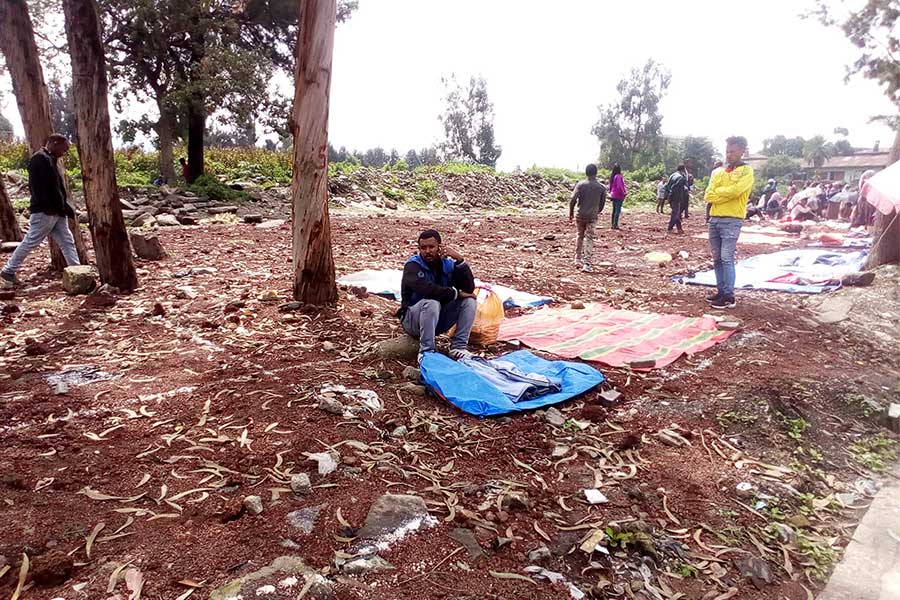
Efforts to form the country's first-ever capital market took a meaningful step last week, but there is a long way to realise an initiative floating around since the Imperial Era.
A trading floor of the Ethiopian Securities Exchange will likely not be opened for another two years. Despite lawmakers legislating a bill that proposed its establishment last year, a federal agency overseeing the capital market has yet to be formed. Financial institutions, such as commercial banks and insurance firms, are expected to be among the pioneers to be listed when the Exchange eventually goes operational. Their executives are keen to exploit the opportunities offered by the capital market.
Girum Tsegaye, president of Berhan Bank, sees the way banks offer shares to the public as unstructured and costly.
“Even the transfer of shares from shareholders to buyers is not easy,” he told Fortune.
Last week, a signing ceremony at the Hyatt Regency Hotel may have come as good news to executives like Girum. Representatives of the Ethiopian Investment Holdings, led by its Chief Executive Officer (CEO), Mamo Mihretu, and Ahmed Shide, minister of Finance, inked an agreement with Financial Sector Deepening (FSD) Africa, a UK Aid-affiliated NGO based in Kenya. The tripartite agreement forms a project team that will pave the way for establishing the Ethiopian Securities Exchange (ESE). The team will report to Mamo, Prime Minister Abiy Ahmed's (PhD) policy advisor and Ethiopia's chief trade negotiator.
The Prime Minister appointed Mamo three months ago to lead Ethiopia's first sovereign wealth fund. It was established with an authorised capital of 100 billion Br, of which one-fourth is to be paid up. The Fund has been mandated with seeing through the formation and establishment of the capital market, a responsibility that regulators had previously shouldered at the central bank.
“The project team is tasked with preparing the business plan, drafting the rules of engagement and identifying partners,” said Mamo.
To be established as a share company with equity contributions from the federal government and the private sector, the Exchange serves as a capital market where equities, derivative instruments, financial and debt securities, and currency exchange contracts will be traded. Financial institutions are expected to be the first to join as founding shareholders. No less than a quarter and no more than 55pc of shares will be allocated to corporations, capital market intermediaries, and international securities exchange operators. The government's stake will not exceed a quarter of the Exchange's capital.
Officials say they have yet to decide on the Exchange's initial capital. Once it is established, trading will be overseen and managed by a board of directors elected by shareholders.
The platform will be for-profit, earning commissions and markups from listed companies and market transactions.
A Capital Market Authority will supervise the Exchange. Last November, a team of 14 experts chaired by Meles Minale, a senior macroeconomic advisor at the central bank, was formed to explore the establishment of the Authority. The team reports to Yinager Dessie (PhD), governor of the National Bank of Ethiopia (NBE).
A bill to legislate the Authority, which will regulate the primary and secondary markets and supervise the listing and delisting of securities, was tabled to Parliament and approved last year. The Authority will be established as a federal agency accountable to Parliament once the Prime Minister appoints a director and a deputy director. Candidates for appointment will be required to have 10 years of experience in finance, economics, management or law at a senior management level. They will be tasked with safeguarding investors and overseeing the integrity of the capital market. Securities brokers, investment advisers, collective investment scheme operators, investment bankers and securities dealers will be under the supervision of the Authority.
It will, however, take up to two years to launch the Exchange, Meles disclosed to Fortune.
Though the Exchange will be the first capital market, similar initiatives have existed in the past.
In 1965, a quasi-stock exchange dubbed the Addis Abeba Share Dealing Group was established with the listing of 15 companies, including the Addis Abeba Bank, Ethiopia Abattoirs and the Bottling Company of Ethiopia. Attempts to form a full-fledged capital market crumbled with the coming of a socialist government in 1974, which nationalised all the major companies. Even after the fall of the Dergue regime, efforts to open a capital market have remained in vain.
The federal government blocked attempts to launch a quasi stock market in 1999.
“The government had no intention of even entertaining the idea,” said Zemedeneh Negatu, a consultant and board chairperson of Fairfax Global, one of the people involved in the attempt.
The Addis Abeba Chamber of Commerce & Sectoral Associations had also tried its hand under its auxiliary, the Private Sector Development Hub. In 2011, the Hub, with financial support from the Swedish Agency for International Development Cooperation, conducted research on the market potential. After Sufian Ahmed, then minister of Finance, wrote a letter compelling the Chamber to stop in its tracks, the initiative went nowhere.
The previous administration was reluctant to embrace the idea, says Yohannes Woldegebriel, director of the Arbitration Institute at the Chamber.
The Exchange will be the sole securities market in the country, except for the central bank's treasury bills.
“The government has launched the sale of corporate and saving bonds to the public," said Zemedeneh. "There again is a need for a secondary market,” said Zemedeneh.
He observes that Ethiopia is the only African country with a relatively large economy with no stock market. Twenty-nine exchanges operate in Africa.
Promoters of financial institutions under formation are hoping the Exchange will provide new options for raising equity from the public. This includes Zemedeneh, one of the promoters of Selam Bank, an aspirant mortgage bank that began selling equity a year ago.
He warns that the experiences of other African countries indicate the road ahead will not be smooth.
“It'll be even more challenging in the absence of investment advisors and stockbrokers,” said Zemedeneh.
Mamo, the CEO, disclosed the federal government plans to list some state-owned enterprises on the Exchange to speed up privatisation efforts.
PUBLISHED ON
May 21,2022 [ VOL
23 , NO
1151]

Radar | Mar 13,2021

Fortune News | Sep 21,2019

Radar | Sep 28,2019

Radar | Jul 02,2022

Radar | Sep 21,2019

Radar | Mar 09,2019

Fortune News | Jun 15,2019

Delicate Number | Apr 17,2021

Sponsored Contents | Mar 28,2022

Radar | May 26,2021

Dec 22 , 2024 . By TIZITA SHEWAFERAW
Charged with transforming colossal state-owned enterprises into modern and competitiv...

Aug 18 , 2024 . By AKSAH ITALO
Although predictable Yonas Zerihun's job in the ride-hailing service is not immune to...

Jul 28 , 2024 . By TIZITA SHEWAFERAW
Unhabitual, perhaps too many, Samuel Gebreyohannes, 38, used to occasionally enjoy a couple of beers at breakfast. However, he recently swit...

Jul 13 , 2024 . By AKSAH ITALO
Investors who rely on tractors, trucks, and field vehicles for commuting, transporting commodities, and f...

Jun 28 , 2025
Meseret Damtie, the assertive auditor general, has never been shy about naming names...

Jun 21 , 2025
A well-worn adage says, “Budget is not destiny, but it is direction.” Examining t...

Jun 14 , 2025
Yet again, the Horn of Africa is bracing for trouble. A region already frayed by wars...

Jun 7 , 2025
Few promises shine brighter in Addis Abeba than the pledge of a roof for every family...